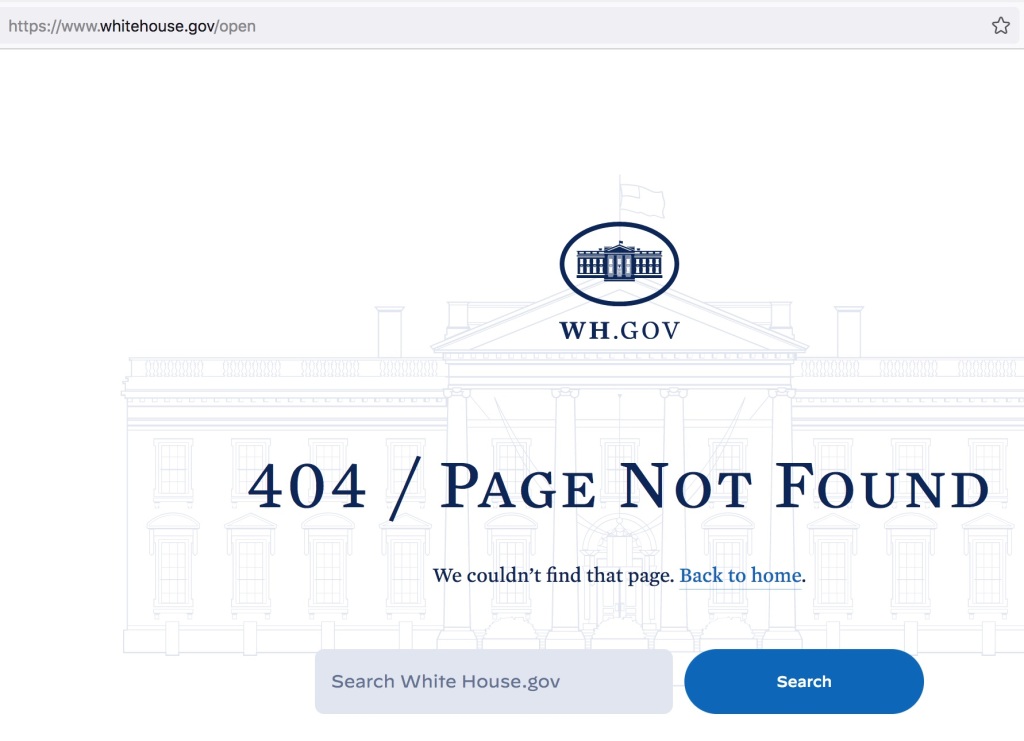
In an email posted to a newsgroup addressed to the “open government community,” the General Services Adminstration asked for comment on which of the past commitments the United States has made to the Open Government Partnership (OGP) should be submitted for a “people’s choice award” at an international summit in December.
At a basic level, the problem with this outreach is many of the dozen listed commitments are of questionable value, or have been rescinded.
For instance, the United States withdrew from a flagship commitment when the Trump White House withdrew from the Extractive Industries Transparency Initiative in 2017. The Institutional Review Mechanism should not have listed it.
“Amendments to the Freedom of Information Act” were not achieved through OGP: the Department of Justice lobbied against reforms, and the Obama White House did not push for reform, resulting in a weaker bill.
The Trump administration censored open climate data and pushed out climate scientists who collected and published it, instead of “promoting” it. The former president directed hatred towards a whistleblower who came forward about the president’s corruption, instead of strengthening whistleblower protections. And so on.
The fact that the IRM put these commitments forward at all places considerable doubt on whether the IRM researchers are accurate arbiters of US government performance or record. It also casts doubt on whether the Biden administration is willing or able to be an honest broker regarding what’s happened to open government initiatives or policies over the past decade. The tepid criticism in the most recent IRM report on the U.S. government’s record on open government, from 2019, did not acknowledge the Trump administration’s attacks on transparency, much less the impact on public trust that would later be so devastating in the pandemic.
At a higher level, however, the fundamental problem in September 2021 is that the Biden White House has not publicly or privately re-engaged with many of the good governance watchdogs and open government advocates that have repeatedly called on the administration to act on the reforms.
To echo an indictment of the last administration’s “opacity by obscurity,” not introducing this call for comment on open government commitments at a press conference and taking questions on it falls far short of the bare minimum we should expect of the United States government. If it’s not issued in the the Federal Register or blogged about at WhiteHouse.gov, why should Americans take it seriously?
That’s a compounding mistake. Instead of rebuilding the broken trust between US government, the people it serves, and the reformers who seek to strengthen it, the White House is not using its convening power or capacity to be publicly responsive to the legitimate concerns of watchdogs exhausted by years of devolving good governance.
There is no reason that GSA Administrator Robin Carnahan, an honorable human with a long record of public service, should not have done so, save that it would be more appropriate if it was coming from the White House. President Biden and Vice President Kamala Harris have had little to say or do regarding the multi-stakeholder initiative that the current administrator for U.S. Agency for International Development once called President Obama’s “signature good governance initiative.”
After the most corrupt administration in U.S. history showed the dire weaknesses in a system built upon adherence voluntary democratic norms, that has been a profound disappointment for anyone that hoped to see more than a return to the mixed record of the Obama administration. President Biden and Vice President Harris should be holding U.S. government accountable with executive action.
They should be marshaling support for legislative and regulatory reforms externally, & making it clear to faithful civil servants and allies internally that this White House is committed to cultural changes as well, after years fear and chaos, by putting officials on the record and appointing senior ethics officials.
They also should be honest about how past reforms came to pass, what came of them, and what has happened to them since. Neither Data.gov nor USASpending.gov were achieved as the “result” of OGP. White House petitions were ignored under the Trump administration and have not been brought back by this one. So why are all three listed on the GSA’s open government page?
It’s worth noting that this void in public engagement itself violates the final commitment in the most recent National Action Plan for Open Government, which was to Expand Public Participation in Developing Future U.S. National Action Plans:
“Citizen engagement and public participation area among the most important elements of the NAP co-creation process. During the development of this NAP4,everyday Americans provided some of the most thoughtful and engaging ideas. As we begin to contemplate a fifth national action plan, we will prioritize including a more geographically diverse and diffuse representation of citizen stakeholders in the development of the document.We will aim to conduct a series of consultation sessions, in-person meetings,and livestreamed discussions around the country to generate ideas, encourage public input, and engage in conversations with the most important stakeholder–the American public.”
None of that happened after the plan was released in early 2019.
An administration genuinely “committed to transparency” and good governance can and must build back better, from the Office of Management and Budget issuing guidance on the Open Government Data Act (and enforcing it) to shifting its posture on declassification and the Freedom of Information Act.
It’s time for this White House to provide much more than diplomatic cover at the State Department for the civil servants who kept both the spirit and practice of open government alive over the past four years.
There’s no shortage of good ideas, only the political will and personnel capacity dedicated to implementing them.
